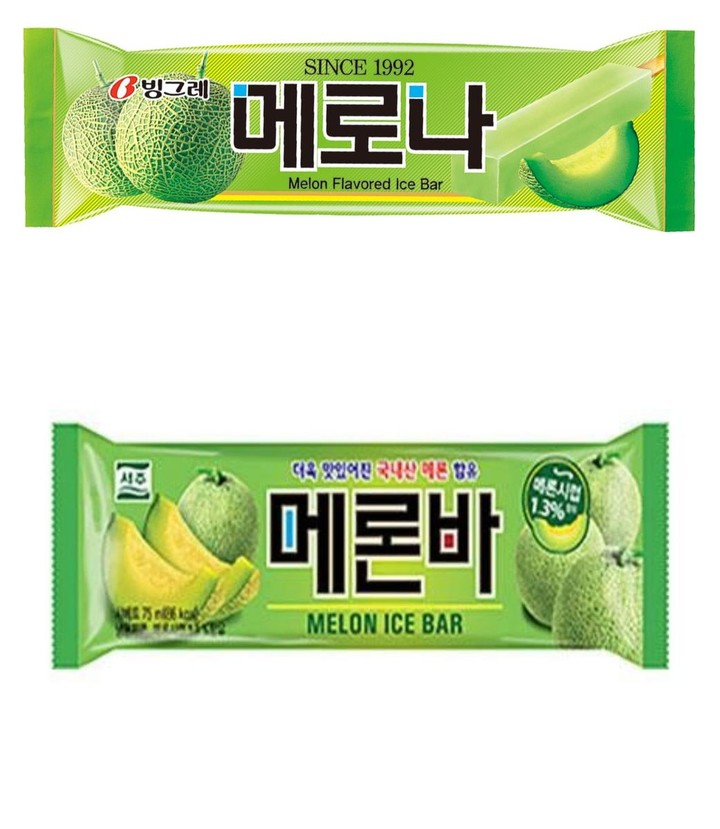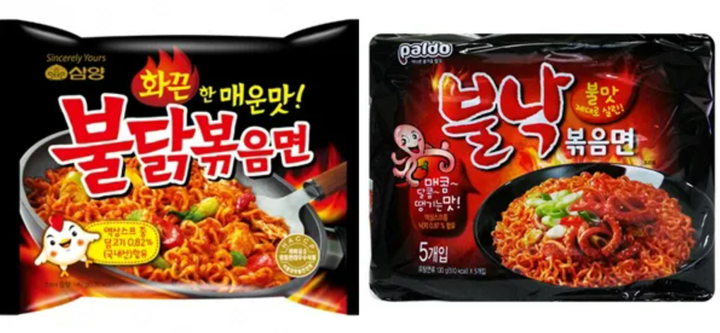Court Recognizes Distinctiveness of Melona’s Design and Potential for Consumer Confusion
Decision Sets New Precedent in Packaging Disputes in the Korean Food Industry

How does the Melona design look to you?
After a lengthy legal battle, the court has acknowledged the distinctiveness of Melona’s packaging and the possibility of consumer confusion, ruling in favor of Binggrae.
On the 22nd, Binggrae announced that it had won the appeal in its unfair competition lawsuit against Seojoo, which sought to ban further infringement of its packaging design.
A Binggrae representative stated, "The court seems to have determined that Binggrae acquired the distinctiveness of the Melona packaging through years of ongoing investment and effort," and added, "We believe our claim, that Seojoo’s Melon Bar packaging is so similar to Binggrae’s Melona that it could cause consumer confusion, has been accepted."
This case originated in 2023, when Binggrae raised concerns that the packaging of Seojoo’s Melon Bar closely mirrored that of Melona, leading to actual confusion among consumers during purchases.
The first trial, held in September last year, sided with Seojoo, but the appellate court overturned this ruling.

During the proceedings, Binggrae emphasized that Melona’s packaging had cemented a unique image among consumers over decades of advertising and distribution efforts. They also presented consumer research demonstrating that, despite the product names being different, confusion was observed on store shelves.
The significance of this ruling lies in its precedent-setting impact within the industry. Previously, Korean food companies rarely prevailed in disputes based solely on packaging similarity. For instance, a 2014 lawsuit by Samyang Foods, claiming Paldo’s Buldak Bokkeummyun packaging imitated theirs, was dismissed. Similarly, in 2017, CJ CheilJedang’s complaints against Ottogi and Dongwon F&B over their cup rice products were not recognized.
In contrast, this recent appeal acknowledged that Melona’s packaging had achieved brand differentiation and strong recognizability beyond just color or design length. This is expected to influence future judgments in similar disputes.
First launched in 1992, Melona became known as Korea’s "national ice cream," while Seojoo’s Melon Bar entered the market in 2014. Legal wrangling between the two has continued over 19 years, and this appellate victory is seen as further clarifying the scope of legal protection for Melona’s packaging.
However, close attention remains on the delivery of the court’s judgment, a review of the detailed decision, and subsequent legal procedures.
Note “This article was translated from the original Korean version using AI assistance, and subsequently edited by a native-speaking journalist.”
Photo=Binggrae, Seojoo
추천 뉴스
- 1 Daniel Dae Kim Raises the Stakes with ‘Butterfly,’ His Ambitious New Spy Thriller Daniel Dae Kim, best known to many as the “husband of Yunjin Kim” from ‘Lost’ and a consistent fixture among Hollywood’s most successful Korean-American actors, is now making his boldest move yet. With ‘Butterfly,’ one of Amazon Prime Video’s most highly anticipated new series, Kim is not only starr
- 2 The Seasons to Return With New Edition Titled '10CM’s Sseudam Sseudam' The long-running KBS late-night music program 'The Seasons' is making a much-anticipated comeback for its eighth season with a fresh title, '10CM’s Sseudam Sseudam'.On August 21st, KBS officially announced that the upcoming season, set to air in September, will bear the new name, highlighting 10CM's
- 3 Strategies Proposed to Boost Regional Tourism Ahead of 30 Million Foreign Visitors Era With South Korea on the brink of welcoming 30 million inbound tourists annually, new strategies have been outlined to channel tourism flows beyond the capital into regional areas. On August 20, the Korea Culture & Tourism Institute (KCTI) released a major study titled “Local Era: Strategies to Revit
- 4 End of the 5th Generation? CORTIS Ushers in the Era of the Creator Generation In August 2025, the K-pop industry hit a new turning point. Amidst the rivalry of countless groups competing under the “5th generation” banner, rookie group CORTIS from Big Hit Music made their debut in a way that felt as though they were from another dimension. Their arrival is not simply another a
- 5 Choi Jeong Becomes First KBO Player to Reach 1,500 Runs as SSG Landers Reclaim Third Place Choi Jeong has etched his name in KBO League history by becoming the first player ever to score 1,500 career runs, leading SSG Landers to an important victory.On August 20, at Suwon KT Wiz Park, Choi took the field as the third batter and third baseman against kt wiz. He crossed home plate twice, th
- 6 LG Twins Clinch 70th Win First, Extend Dominance at KBO League Summit The LG Twins have become the first team this season to notch 70 wins, tightening their grip on the top spot in the KBO League after defeating the Lotte Giants.On August 20 at Jamsil Baseball Stadium, the LG Twins secured a 5-3 victory over the Lotte Giants in the 2025 Shinhan SOL Bank KBO League, ma
- 7 ILLIT Showcases Enchanting Fairy Tale Charm Ahead of Japanese Debut The group ILLIT is capturing attention with an otherworldly, fairy-tale-like allure as they prepare for their upcoming official debut in Japan. The five-member act adorned the cover of the September issue of fashion magazine Elle, evoking the image of protagonists straight out of a fantasy story.Unv
- 8 Lim Yoon-a Captivates with Deer-Like Beauty at 'The Tyrant’s Chef' Press Conference Actress Lim Yoon-a, who is returning as a chef in her latest project, mesmerized the media with her striking “deer-like” beauty at the drama press conference.On the afternoon of August 19, Lim attended the production announcement for tvN’s new Saturday-Sunday drama ‘The Tyrant’s Chef’ at The Saint i
- 9 YouTuber and Comedian Jangwon Hong Suspended All Activities After DUI, Admits to 19-Year Repeat Offense and 50 Days of Silence Jangwon Hong, better known as MC Jangwon and the founder of the YouTube channel ‘MJang Plan,’ which boasts 700,000 subscribers, has publicly confessed to being caught driving under the influence (DUI), subsequently announcing an indefinite suspension of all his activities. What shocked fans and view
- 10 Lim Young-woong’s Every Path Leads Back to “Hero Generation”: A Fandom-Centered Comeback Ahead of the highly anticipated release of his second full album on the 29th, Lim Young-woong recently completed recording a special solo episode of KBS’s “Immortal Songs” on the 18th—a first with his name in the program’s title. According to fans who attended, the event was one for the record books
